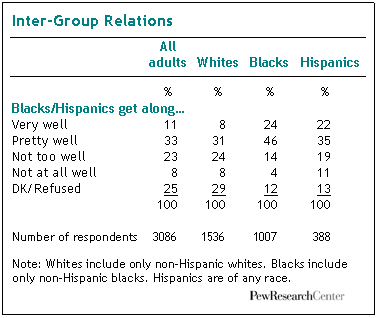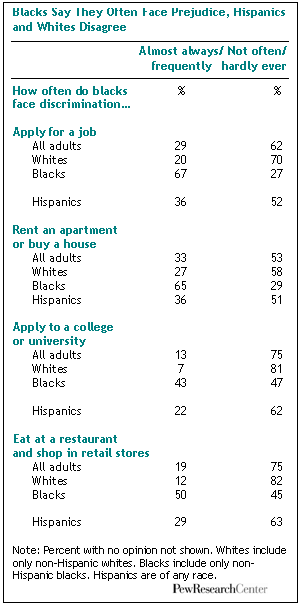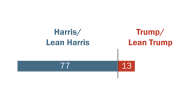While blacks and Hispanics hold broadly favorable views of each other, Hispanics are less likely to say the two groups get along well. At the same time, African Americans are far more likely than Latinos to say blacks are frequently the victims of racial discrimination, according to a recent survey of racial and ethnic attitudes by the Pew Research Center.

The country’s two largest and most powerful minority groups also disagree on other issues that strike close to the heart of many blacks and Hispanics, though these differences are generally modest. Notably, blacks are more likely to say the situation for African Americans is worse today than it was five or even 10 years ago. Nearly half of all blacks also say immigrants reduce job opportunities for blacks, while fewer than four-in-10 Hispanics agree.
The current round of Democratic presidential primaries has brought the issue of Hispanic-black relations onto center stage. Overwhelming majorities of blacks have supported Barack Obama, while Hillary Clinton has counted on majority support among Hispanics, coupled with her strong support from whites, to counter Obama’s appeal among African American voters.
In the recent Florida Democratic primary, Clinton beat Obama among Hispanics by nearly 2-1 while Obama countered by winning blacks by better than 2-1. This race and ethnicity gap, apparent throughout the 2008 primary season, has led some to ask if the division reflects larger and more troubling tensions between the two groups.
The Pew survey suggests that the answer depends on the question that you ask. On many core issues, majorities or large pluralities of blacks and Hispanics share the same view. At the same time, the poll also pinpoints some areas of disagreement and potential conflict. The telephone survey was taken from Sept. 5 through Oct. 6, 2007 among a nationally-representative sample of 3,086 adults.
Hispanics More Likely to Say Groups Do Not Get Along
The survey found that overwhelming majorities of both blacks and Hispanics have favorable views of each other. Fully three-quarters of all blacks (77%) have a very or somewhat favorable view of Latinos, while 79% of Hispanics have a similarly positive view of blacks. (Three-quarters of all whites also have an approving view of Hispanics and a slightly larger percentage expressed a favorable opinion of blacks.)

But some differences begin to emerge when blacks and Hispanics are asked how well the two groups get along. A majority of blacks (70%), but a smaller share of Hispanics (57%), say the groups get along very or fairly well. At the same time, Hispanics are significantly more likely than blacks to say that inter-group relations are strained (30% vs. 18%). Whites are roughly equally divided, with nearly four-in-10 (39%) saying that blacks and Hispanics get along well, 32% saying they do not, while nearly as many express no opinion.
This “perception gap” on inter-group relations persists even when controlling for socio-economic status. For example, 63% of all better-educated Hispanics — those who had attended college — say blacks and Latinos get along well, compared with 73% of similarly educated blacks. That’s a 10-point difference — little different than the overall 13-point gap between the two groups. Similar differences emerge in most age and income categories as well.
Love Thy Neighbor
Does familiarity breed tolerance or contempt? It depends. Hispanics and blacks living in counties with relatively high concentrations of African Americans are somewhat more likely to say that blacks and Latinos get along well (65% Hispanics, 72% blacks) than are Hispanics and blacks living in low-density black counties (50% and 57% respectively), suggesting proximity is associated with greater acceptance. But there is no difference in perceptions of relations between blacks and Hispanics between who live in counties with relatively higher or lower concentrations of Latinos; in either case, about two-thirds of blacks and six-in-10 Hispanics think the two groups get along well.
Differences on Core Issues
On some issues key to both groups, strong differences emerge. For example, on the issue of racial discrimination, blacks acknowledge that some progress has been made. But majorities also say bias against blacks remains widespread in key areas of American life, notably in housing and employment. In contrast, most Hispanics reject the view that blacks frequently face discrimination in these areas, offering positions that tend to be much closer to the views of whites than to those of blacks.

For example, two-thirds of all African Americans say blacks are “almost always” or “frequently” discriminated against when they apply for a job, compared with 36% of Hispanics and 20% of whites. Similarly, blacks are about twice as likely as Hispanics to say that blacks face discrimination when buying a house or renting an apartment (65% vs. 36%), applying to college (43% vs. 22%) or dining at restaurants or shopping in retail stores (50% vs. 29%).
The different way that African Americans and Hispanics view the prevalence of racism is underscored when these four questions are analyzed together. About one-in-four (26%) blacks say discrimination “almost always” or “frequently” occurs in each of the four activities tested in the survey: applying for a job or admission to college, shopping or eating out, or seeking to buy or rent housing. Another 24% say blacks frequently encounter racism in three of the four areas. Only 19% report that racism is not frequently found in any of the four domains. In contrast, 45% of Hispanics (and 63% of whites) say blacks do not frequently encounter racism in any of the areas tested. By the same token, only 11% of Hispanics and 3% of whites believe that blacks often experience racism in all four areas.
Blacks and Hispanics also see the extent of black progress in somewhat different ways, with African Americans distinctly more negative about the advancement they have made as a group in recent years. Fewer than a third (31%) of all blacks but 44% of Hispanics say the situation of black people in the United States has improved in the past decade. By the same token, blacks are three times more likely than Hispanics to say that things have gotten worse (22% vs. 7%), with the remainder reporting no change.
Contrasting Views on Illegal Immigration, Integration
Hispanics also are significantly more likely than African Americans to view illegal immigration as a serious problem in their communities. Overall, more than four-in-10 Hispanics (44%) say illegal immigration is a big problem in their communities compared with 28% of blacks. Views of Latinos and blacks on the seriousness of the immigration problem are virtually identical in counties that have the smallest proportion of Hispanics. In these communities, only about one-in-five see illegal immigrants as a concern. But in counties with comparatively large Hispanic populations, there is an 11 percentage-point difference between Latinos and blacks (47% vs. 36%) and, significantly, these counties are home to about seven-in-10 Latinos.
Hispanics also are somewhat less enthusiastic than blacks about residential integration. Six-in-10 blacks compared with half of all Hispanics say they would like to see the country become more integrated in terms of minorities and whites living in the same neighborhoods. Among whites, 41% say they want more integration while 44% say current levels of integration are “about right,” a view shared by 38% of Hispanics and 28% of blacks. (Since the question specifically asked for their views of “minorities and whites” living together, this finding may say more about how blacks and Hispanics feel about living among whites than how they feel about living near each other.)
On other questions about discrimination, Hispanics and blacks express similar views. For example, when asked if discrimination or personal shortcomings are the main reason why some blacks don’t succeed, roughly similar majorities of blacks (53%) and Hispanics (59%) say blacks themselves are responsible, a view shared by 71% of all whites.




